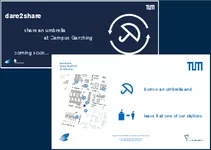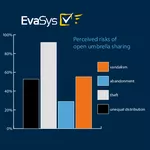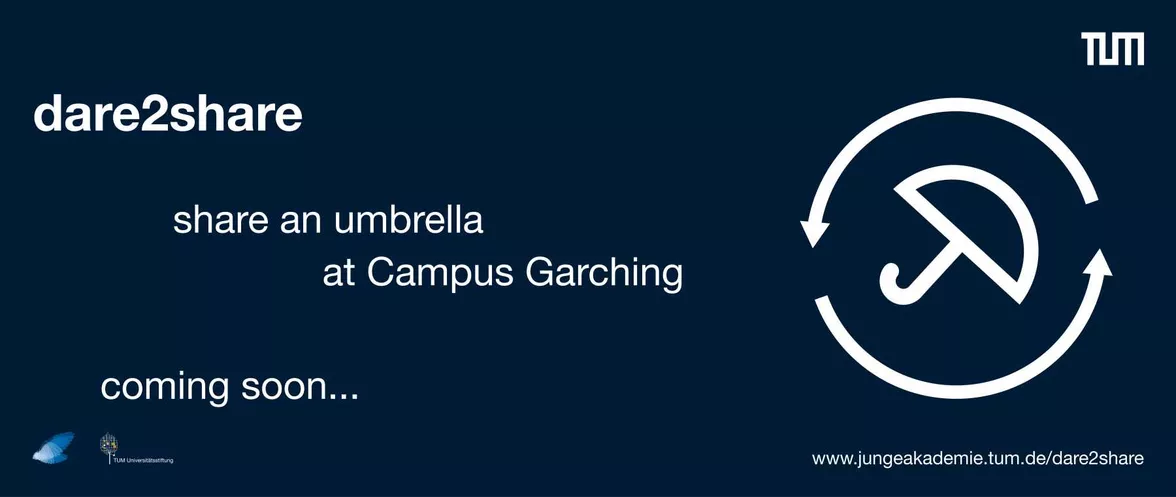dare2share
Wie "Teilen" Eigentum ersetzte.
Project Description
The recent emergence of sharing economy products showed the consumer acceptance and economic profitability of replacing classical property with shared services. Whereas current concepts focused on high-value products, the dare2share project analyzed its feasibility with mundane but often unavailable objects.
Umbrella Sharing in Garching
Using the example of umbrellas, such a free sharing model was established at the campus of the research centre Garching. During this field experiment, an electronic module recorded the umbrella locations, and the project team monitored how users treated the borrowed umbrellas.
This data allowed inferring the frequency of service misuse, determining on-campus movement patterns, and assessing the project hypothesis.
Hypothesis
Consumers participated in well-accessible sharing models, but appreciated proprietary products over shared products.

Based on the theoretically determined key components of a successful sharing concept - availability, suitability, and awareness - an umbrella was regarded as a reasonable sharing object:
It could be stored in a relatively small space, allowing the design of custom sharing stations. As a bounded area with long walking routes, campus Garching was selected for the first project run.

Walking-stick umbrellas: Most people preferred this type for use. As there was no need to transport them after use, they were perfect within a sharing system.
Big umbrellas: It was possible to use one with several people at once. Besides, that made them less likely to get lost or stolen.
Unique umbrellas: People recognized them to be part of a sharing system.

Potential users were informed about the project in advance. The umbrella sharing principle and station network were comprehensively explained with concise phrases and pictograms.
The project aimed to convince passersby of the sharing system and increase the brand awareness of the TUM: Junge Akademie.

In 2014, the project zusammen.sammeln's barrels were repurposed as umbrella-sharing stations: intermediate bottoms and sectioning bars inside the barrels assured proper outflow of water and ordering of umbrellas.
The station locations were chosen in a way that the walking routes between major buildings, like the subway, cafeteria, and faculty buildings, were integrated into the station network.

In order to adjust the design to actual user needs, a survey was conducted and distributed at TUM.
Data collected ranged from walking paths as reference points for the station location setup, over interest in participation in sharing models to responsibility in usage. Furthermore, direct input of design ideas was actively encouraged.

All umbrellas were equipped with iBeacons. This enabled cost-effective tracking of the umbrellas across the campus: At each station, a Raspberry Pi detected nearby umbrellas.
This data provided valuable information about the fluctuation of the umbrellas and about the necessity of manual reallocation. Linking the datapoints allowed us to furthermore retrace the on-campus walking routes.
First Results
The user survey that was conducted before the field experiment had revealed some critical points in the design of the sharing concept, which the project team had approached.
Although 92% had perceived theft of umbrellas as a risk, 73% of the participants had expected user contribution, e.g. the willingness to bring back abandoned umbrellas to the stations. While this was a good sign for the potential of the sharing concept, the actual contribution had to be examined during the field experiment.
Outlook
At the start of the field experiment, another survey was carried out. The findings from both surveys were contrasted with the field data, with the aim of deducing essential factors that determined the success of a sharing model. After adjusting the station and umbrella design choices, the experiment was repeated on campus Weihenstephan.
In a final step, users might have been asked to provide umbrellas themselves, which could have eventually led to a self-sustaining service.
Team
Contact
dare2share(at)jungeakademie.tum.de
Members
Maximilian Bauer, Gunther Bidlingmaier, Markus Feuchtinger, Marliese Höfer, Beate Lang, Frank Mildner, Sebastian Mühlbauer, Felix Nuscheler, Maike Offer, Eva-Maria Schmid, Max Teichgräber, Michael Trimpl, David Wei, Yize Zhuwu
Tutors
Stefan Tippelt, Carolin Thiem, Simon Herzog
Mentors
Prof. Fritz Frenkler, Alexander Lang
